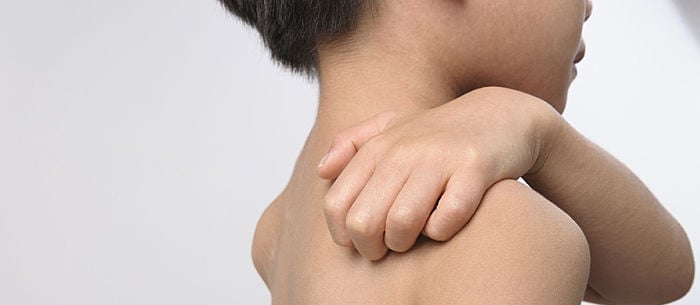Hives in children are no fun for anyone. Your little one is itchy, uncomfortable and irritable, and you’re worried the rash will spread. Not sure what’s going on? Here’s the lowdown on hives, what causes them and how you can get your kid feeling better.
What Are Hives?
“Hives are almost always very itchy and appear as raised red bumps or areas on the skin. They occur when a chemical called histamine is released from cells called mast cells in the skin,” says Dr. David Stukus, an assistant professor of pediatrics in the Allergy and Immunology Department of Nationwide Children’s Hospital. “We have mast cells throughout our bodies and they are in every single organ, including the skin. Histamine causes all the symptoms of hives, especially itching.”
Though many cases of hives will only last for a short time, chronic hives, according to the Mayo Clinic, last more than six weeks or recur over a period of months or even years. These red, itchy bumps can be very uncomfortable for children, and can be quite scary looking for parents but there’s a lot you can do to help.
What Causes Hives in Children?
Hives, also known as urticaria, can seem to pop up out of nowhere. “Hives are not always due to an allergic reaction. While food and environmental allergies are the main causes of hives, they are not the only reason children may develop hives,” says Dr. Stukus. Not sure what caused the red bumps? That’s OK. “Most cases of hives are called idiopathic, which means no identifiable cause. These are usually due to viral infections and are very short lived, lasting a week or so,” says Dr. Stukus.
If your child has a sudden case of hives, look at the most likely culprits. “The most common causes of acute urticaria include infections, medications, foods or insect bites and stings,” says Dr. Michael Krathen, a board-certified dermatologist. “The most common causes of urticaria caused by food in children are milk, egg, peanuts, tree nuts, soy and wheat.” The appearance of hives is often the first indicator of a food or environmental allergy.
Dr. Stukus says, “If a child has known allergies, then exposure to their allergen often causes hives as the first symptom to occur. This often comes from contact with the skin, but can also occur with food allergy after ingestion.”
How Can You Help?
Dr. Stukus recommends parents go straight for the oral medicine to treat hives in their children. “Hives actually originate from inside the body, and antihistamine medications are very effective since histamine is the chemical causing all the trouble. Antihistamines can be used every day, or as needed, depending upon how frequently and severely hives are occurring. Many children will be treated with oral corticosteroids (prednisone), especially when treated by an emergency room for their hives.”
Topical treatments help soothe hives, too. Dr. Krathen says, “An over-the-counter hydrocortisone cream or ointment can also be applied to the urticaria to help.” While traditional antihistamines like diphenhydramine can cause drowsiness, he says, newer second-generation antihistamines such as loratadine don’t cause this side effect, so see what works best for your child.
Besides medicine, there are other things that may also help your child cope with hives. “Non-medication treatments include relaxation and distraction techniques to help with itching, and possibly soaking in a cool bath,” says Dr. Stukus. Sing songs, play a game or watch a movie to keep your kid’s mind off his discomfort.
To prevent hives in the future, try to find the cause. If you suspect your child’s hives are caused by food allergies, an elimination diet can help you identify a certain food trigger. Also consider environmental factors that can cause skin issues, such as laundry detergents, chemicals and soaps.
Sometimes hives may need immediate medical attention from a doctor. “Make sure there are no other worrisome signs of allergic reaction such as shortness of breath, swelling of the tongue or lips. If these features are noted, be sure to seek out emergency help from the pediatrician or local hospital,” says Dr. Krathen. For more serious cases of hives, talk to your child’s pediatrician or find a local pediatric allergist or dermatologist to discuss your kid’s specific case.
And check out I Think My Child Has a Rash.
Amy Aitman, a freelance writer for 8menwriting.com, and mommy blogger at mommypatter.com, loves writing about parenting issues. Her now 4-year-old son has had his share of hives and itchy skin issues due to allergic reactions to foods.
* This article is for general informational purposes only. It is not intended nor implied to be providing medical advice and is not a substitute for such advice. The reader should always consult a health care provider concerning any medical condition or treatment plan. Neither Care.com nor the author assumes any responsibility or liability with respect to use of any information contained herein.




